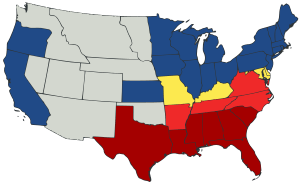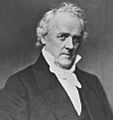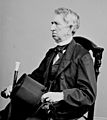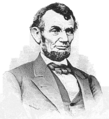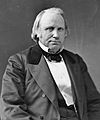Causes of the American Civil War facts for kids
The American Civil War was a huge conflict in the United States from 1861 to 1865. Many historians agree that slavery was the main reason for this war. It caused a lot of arguments and disagreements between different parts of the United States in the 1850s. The Republican Party, led by Abraham Lincoln, wanted to stop slavery from spreading to new areas. Many Southern leaders said they would leave the United States if Lincoln won the 1860 election. When Lincoln won, several Southern states decided to leave the Union. They worried that they would lose their power to protect slavery. The Battle of Fort Sumter in April 1861 was the first battle of the war.
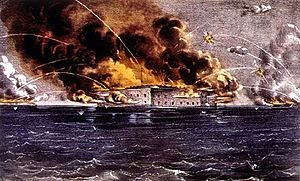
Contents
Slavery: The Main Cause
Slavery was a huge reason why the country split apart. In the North, slavery was mostly against the law by the early 1800s. It was slowly disappearing in some areas, but it was growing fast in the South. This was especially true where cotton was grown because it made a lot of money.
People in the North who were against slavery wanted to stop it from spreading. They hoped this would eventually make slavery disappear everywhere. But the Southern states, where slavery was common, said this went against their rights. White Southerners believed that ending slavery would ruin their economy. This was because they had invested so much money in enslaved people. They also worried about what would happen if so many formerly enslaved Black people became free.
Sectionalism: North vs. South
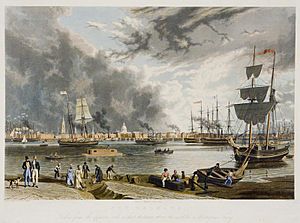
Sectionalism means that different parts of a country have very different ways of life. This includes their economies, social structures, customs, and political ideas. This difference grew a lot between 1800 and 1860.
The North became more industrial and urban. It built many factories and cities, and its farms were very successful. The South, however, focused on large farms called plantations. These plantations relied on the labor of enslaved people to grow crops like cotton. There were also many poor farmers who grew just enough food for themselves.
States' Rights: Can a State Leave?
The Southern states argued that each state had the right to leave the United States whenever it wanted. They believed the U.S. Constitution was like an agreement between states.
However, people in the North, including President Buchanan, disagreed. They said that the Founding Fathers created a country that was meant to last forever. They did not believe states could just leave.
Territorial Crisis: Who Decides on Slavery?
Between 1803 and 1854, the United States grew much larger. It gained new land through buying, talking, and fighting. At first, new states created from these lands were added to the Union in equal numbers of slave states and free states.
But when it came to the lands west of the Mississippi River, the fight over slavery became very intense. Both the North and the South realized something important. They knew that whoever had the power to decide if slavery could exist in these new territories would also decide the future of slavery itself.
Lincoln's Election: The Final Push
When Abraham Lincoln won the election in November 1860, it was the final event that pushed the Southern states to leave. Southern leaders were afraid that Lincoln would stop slavery from spreading. They believed this would eventually lead to slavery being completely ended.
The slave states had already become a smaller group in the House of Representatives. Now, they faced a future where they would always be a minority in the Senate and the Electoral College. This meant the North would have more and more power. Before Lincoln even became president in March 1861, seven slave states had already declared they were leaving the Union. They then joined together to form the Confederacy.
Images for kids
-
President Andrew Jackson viewed South Carolina's attempts to nullify the tariffs of 1828 and 1832 as being tantamount to treason.
-
Slaves working in the fields, on the Confederate $100 bill, 1862–63. On the left is John C. Calhoun, on the right Columbia.
-
John J. Crittenden, author of the Crittenden Compromise bill, December 18, 1860
-
Stephen A. Douglas – author and proponent of the Kansas–Nebraska Act of 1854
-
Platform of the American Anti-Slavery Society, founded in 1833 by William Lloyd Garrison and Arthur Tappan
-
A woodcut from the abolitionist Anti-Slavery Almanac (1839) depicts the kidnapping of a free African American with the intention of selling him as a slave.
-
Abolitionist Frederick Douglass
-
Radical abolitionist John Brown
-
Slave Dred Scott
-
William H. Seward, Secretary of State under Abraham Lincoln and Andrew Johnson
-
"Vote yourself a farm—vote yourself a tariff": a campaign slogan for Abraham Lincoln in 1860
-
Henry Wilson, author of History of The Rise and Fall of the Slave Power in America (1872–1877)
See also
 In Spanish: Orígenes de la Guerra de Secesión para niños
In Spanish: Orígenes de la Guerra de Secesión para niños


